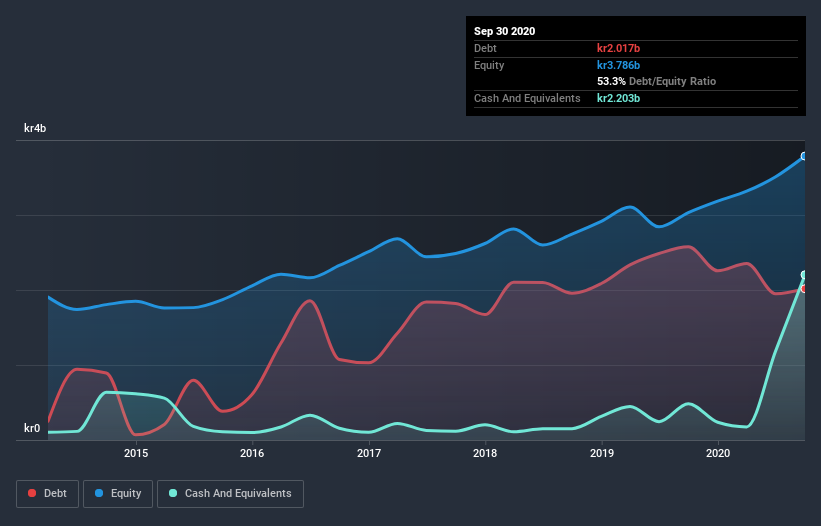
David Iben put it well when he said, 'Volatility is not a risk we care about. What we care about is avoiding the permanent loss of capital.' When we think about how risky a company is, we always like to look at its use of debt, since debt overload can lead to ruin. As with many other companies Bilia AB (publ) (STO:BILI A) makes use of debt. But the real question is whether this debt is making the company risky.
What Risk Does Debt Bring?
Debt assists a business until the business has trouble paying it off, either with new capital or with free cash flow. Ultimately, if the company can't fulfill its legal obligations to repay debt, shareholders could walk away with nothing. However, a more common (but still painful) scenario is that it has to raise new equity capital at a low price, thus permanently diluting shareholders. By replacing dilution, though, debt can be an extremely good tool for businesses that need capital to invest in growth at high rates of return. The first thing to do when considering how much debt a business uses is to look at its cash and debt together.
View our latest analysis for Bilia
How Much Debt Does Bilia Carry?
You can click the graphic below for the historical numbers, but it shows that Bilia had kr2.02b of debt in September 2020, down from kr2.58b, one year before. However, its balance sheet shows it holds kr2.20b in cash, so it actually has kr186.0m net cash.

A Look At Bilia's Liabilities
Zooming in on the latest balance sheet data, we can see that Bilia had liabilities of kr6.24b due within 12 months and liabilities of kr5.44b due beyond that. Offsetting this, it had kr2.20b in cash and kr1.33b in receivables that were due within 12 months. So its liabilities outweigh the sum of its cash and (near-term) receivables by kr8.15b.
This deficit is considerable relative to its market capitalization of kr10.3b, so it does suggest shareholders should keep an eye on Bilia's use of debt. This suggests shareholders would be heavily diluted if the company needed to shore up its balance sheet in a hurry. Despite its noteworthy liabilities, Bilia boasts net cash, so it's fair to say it does not have a heavy debt load!
Also positive, Bilia grew its EBIT by 25% in the last year, and that should make it easier to pay down debt, going forward. The balance sheet is clearly the area to focus on when you are analysing debt. But it is Bilia's earnings that will influence how the balance sheet holds up in the future. So if you're keen to discover more about its earnings, it might be worth checking out this graph of its long term earnings trend.
Finally, a company can only pay off debt with cold hard cash, not accounting profits. Bilia may have net cash on the balance sheet, but it is still interesting to look at how well the business converts its earnings before interest and tax (EBIT) to free cash flow, because that will influence both its need for, and its capacity to manage debt. Over the last three years, Bilia reported free cash flow worth 18% of its EBIT, which is really quite low. For us, cash conversion that low sparks a little paranoia about is ability to extinguish debt.
Summing up
Although Bilia's balance sheet isn't particularly strong, due to the total liabilities, it is clearly positive to see that it has net cash of kr186.0m. And it impressed us with its EBIT growth of 25% over the last year. So we are not troubled with Bilia's debt use. The balance sheet is clearly the area to focus on when you are analysing debt. But ultimately, every company can contain risks that exist outside of the balance sheet. For example, we've discovered 2 warning signs for Bilia that you should be aware of before investing here.
At the end of the day, it's often better to focus on companies that are free from net debt. You can access our special list of such companies (all with a track record of profit growth). It's free.
If you’re looking to trade Bilia, open an account with the lowest-cost* platform trusted by professionals, Interactive Brokers. Their clients from over 200 countries and territories trade stocks, options, futures, forex, bonds and funds worldwide from a single integrated account. Promoted
Valuation is complex, but we're here to simplify it.
Discover if Bilia might be undervalued or overvalued with our detailed analysis, featuring fair value estimates, potential risks, dividends, insider trades, and its financial condition.
Access Free AnalysisThis article by Simply Wall St is general in nature. It does not constitute a recommendation to buy or sell any stock, and does not take account of your objectives, or your financial situation. We aim to bring you long-term focused analysis driven by fundamental data. Note that our analysis may not factor in the latest price-sensitive company announcements or qualitative material. Simply Wall St has no position in any stocks mentioned.
*Interactive Brokers Rated Lowest Cost Broker by StockBrokers.com Annual Online Review 2020
Have feedback on this article? Concerned about the content? Get in touch with us directly. Alternatively, email editorial-team (at) simplywallst.com.
About OM:BILI A
Bilia
Operates as a full-service supplier for car ownership in Sweden, Norway, Luxemburg, and Belgium.
Undervalued with adequate balance sheet and pays a dividend.
Market Insights
Community Narratives



